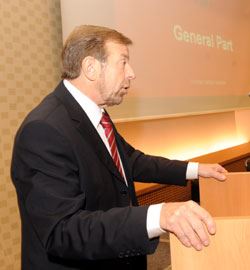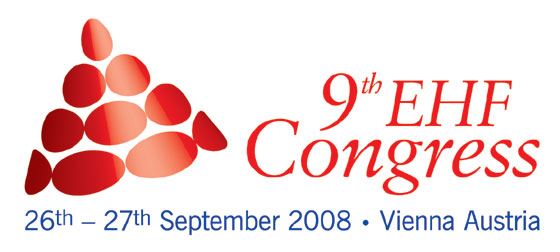

Keynote address by EHF President Tor Lian
Keynote address by EHF President Tor Lian
Dear Handball friends,
Four years ago, you gave your confidence to a partly new team to conduct the business of the EHF. Even if most of the persons you elected were well known to you and had already been involved in EHF business, a task redistribution took place. Unfortunately, one member of the team that was then elected has since passed away and I know, that just like me, you remember Boris Makarov with gratitude and affection.

I prefer to give you a political perspective over the last four years in their articulation with proposals for the coming period of time.
The first phase in the development of the EHF, from its foundation to our last electoral congress, was a particularly active phase. It was a phase of emergence into existence. It was characterised by the setting up of
-
A political structure,
-
An administrative structure,
-
A building in Vienna for our administration,
-
A European network of officials and experts,
-
An educational approach, developing the field of methods and coaching
-
European competitions
-
For national teams,
-
For club teams,
-
For younger age categories
-
-
This early period was also characterised by many development projects which were to naturally lead to new evolutions.
The transition between this first phase of development and the last four years was made comfortable by four essential factors:
-
Stability in the leadership of the EHF
-
Stability in the administration
-
Coherence and transparency of the decision making process
-
Fast implementation of necessary actions
THE 2004-2008 TERM OF OFFICE
It will come as no surprise then that the 2004-2008 term of office was first and foremost characterized by a clear continuity in many sectors of the EHF activity.
You will be aware of the fact that this continuity combined with significant new developments in our global policy.
The political motivation behind those innovations was our desire to give the EHF its right place and position in a complex and permanently changing system.
One of our first targets was to connect better with the IHF.
It is no mystery that the initial period was characterized by difficulty between EHF and IHF. Over this period, dialogue was never interrupted and both associations always made sure that their difficult dialogue preserved its institutional dimension and was never allowed to damage the sport for which all of us have been working so hard for so many years.
The resolution of our differences was achieved through a period of joint activity, regular consultations, shared analyses and common work on future developments. This phase was characterized by a joint desire to take into account the often contradictory needs of Europe and the other continents.
All this was made possible by the constructive approach of both the IHF and the EHF leaderships. It was, above all, made possible by the clear position and supportive and constructive approach of a great number of the presidents of national federations of Europe.
The permanent dialogue that took place over these last four years between the national handball federations of Europe and the leadership of the EHF above all made it possible to take into consideration and implement many new developments.
All new initiatives were taken democratically fully using the possibilities offered by
-
Extraordinary congresses,
-
Presidents’ conferences,
-
Working groups,
-
Task forces,
-
Seminars and forums of all kinds.
This concrete and regular support of the national federations made it possible for the EHF to initiate a dialogue with the clubs competing on a European level and the national professional leagues.
Many issues have to be considered on the basis of a joint approach.
This, in particular, but not exclusively concerns the articulation between national team competitions and club competitions.
The partners the EHF has to take into account inside Europe are
-
The national federations,
-
The leagues,
-
The clubs,
-
The players,
-
The media,
-
The marketing partners.
And of course we have to rely heavily on the expertise supplied by the scientific and medical sector.
Several major initiatives were taken over the last four years.
I would like, in particular, to underline the importance of the foundation of EHF Marketing.
-
The main idea, in establishing this daughter business was to generate more income for the clubs taking part in the Champions’ League.
-
Our second motivation was to put ourselves in conformity with Austrian law concerning non-profit making organisations.
After a period of transition where the secretary general of the EHF also played the role of managing director of EHF Marketing, we have now appointed a full-time managing director and we look forward to new developments in the best interest of our top clubs and the product Champions League
It is also essential to bear in mind the institutional developments that took place with the overwhelming support of the national handball federations of Europe after the main clubs of our continent had expressed their legitimate desire to be more significantly involved and better taken into account.
Major decisions were taken on the occasion of our two extraordinary congresses in Rome and in Lillehammer. These decisions were implemented as rapidly as possible and we have no doubt that the new EHF committees and EHF Marketing boards will produce new proposals and contribute to further advances in the development of handball in Europe.
Inevitably these committees and boards have an impact on existing bodies. A balance and a satisfactory articulation must be established between these. I have no doubt that this will be the case thanks to everybody’s goodwill and desire to guarantee the further development of handball in Europe and beyond.
This dialogue with clubs has taken various forms and, in particular, I have personally been involved in an ongoing exchange with the main club representatives and so have several other officials of the EHF. Solutions to existing problems are not always easy to find and it is only through dialogue that we can hope to accommodate the contradictory demands of the various forces of our sport and find the right solutions.
The competitions conference which we organized in Vienna earlier in the year was another way for us of encouraging dialogue between these forces. It was on this occasion that the members of the committees and boards were elected, the Executive Committee of the EHF relinquishing its right to nominate members so as to ensure the best possible representation of those concerned.
It is the sincere wish of the leadership of the EHF to intensify this dialogue. Together we must progress so as to make it possible to take into account the situation and difficulties of the clubs and leagues all over Europe. If we want to achieve this we must fulfill three conditions:
-
All clubs participating in European competitions must be involved.
-
A clear status must be established for the body representing club handball.
-
Communication between the clubs and the EHF must be conducted on an open basis and avoid the interference of third parties whose approach does not correspond to the ethical approach so far promoted by the EHF.
We have also fostered dialogue with the players:
The European Championship in Norway was the occasion of a first meeting with those who are trying to build up a European players’ union.
We immediately took the decision to invite their representatives to participate in the competition conference and to be our guests on the occasion of this congress.
I want to assure them that we intend to continue working with them and for them and that our strongest desire is to create conditions that will supply players with the best possible conditions for their development both inside and outside handball.
Last, but not least, we have created a youth forum so as to involve the younger generations and benefit from their input and their dynamism.
In order to promote the development of our sport on rational and sound bases we made sure, over the past four years, to benefit from whatever expertise was needed to build our strategy.
I want to express my gratitude to those who, coming from outside the world of handball have contributed to our reflection during this period.
-
The communication specialists,
-
The legal experts,
-
The marketing experts,
-
The brand specialists
-
The scientific and medical experts
have largely contributed to the evolution of our approach.
Finally, I wish to evoke a facet of our activity which may not be so familiar to most of you in spite of the information we tried to supply you with.
We made sure, over the last four years that we played our role and occupied our full position inside Europe in the field of sport politics.
This was achieved through continuous cooperation with the other team sport federations and also with the European Union as well as the European Parliament.
The outcome of this rich cooperation is an agreement to defend what is known as “the European Sport Model”, a model characterized by open competitions, solidarity between the various levels of competition and one where sport has a major role to play in the development and promotion of each individual.
I have asked Mr. Alex Phillips of UEFA to present our joint approach concerning these questions and I wish to thank him for his acceptance of our invitation and we are looking forward to this information after the Presidents report.
THE COMING TERM OF OFFICE
Over the next four years, we intend to continue working in the same spirit and to continue defending the vision of sport the EHF has always stood for.
We wish to contribute to a better articulation of the interests of the various stakeholders taking into account our partners in and outside Europe, in and outside handball.
This means
-
The involvement of all stakeholders in the reflection and decision-making processes.
-
The development of interest groups on a clear, democratic and constructive basis.
-
A desire on all parts to work through dialogue.
-
A need to clearly reject concepts and persons wishing to foster a sport model in contradiction with the European sport model.
We shall continue promoting the development of handball in countries where it has not yet reached a significant position.
We shall continue our efforts in favour of education and development all over Europe.
We shall continue developing the professionalization of the top events in order to promote our sport and to increase the value of the activities for the benefit of all involved.
We shall continue our efforts in the field of marketing to generate new resources for EHF actions, but also to support all stakeholders in their activities.
The development of handball in the coming years must be based on a philosophical and ethical approach, on inclusion, on permanent and constructive dialogue.
The work achieved so far means that the EHF is ready to face the challenges of the future and to further develop handball in Europe as well as to contribute to its promotion worldwide.
Ladies and gentlemen, this concludes my report to the 9th EHF Congress. I am looking forward to constructive and productive discussions and decisions over the course of the weekend in the interest and to the benefit of our sport.
Photos by Leo Hagen (www.hagenpress.com)






